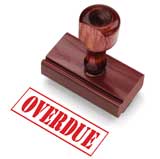 Did you know that poor cashflow is the #1 killer of small New Zealand businesses?
Did you know that poor cashflow is the #1 killer of small New Zealand businesses?- Do you have clients with overdue invoices right now?
- Do you grit your teeth when you check your bank account on the 20th of the month and find the deposits you were expecting, missing?
- Are your customers/clients slow to pay?
- Are your invoices due on the 20th of the month but sometimes they don’t get paid until much later? Sometimes 60 days or 90 days?
Well you’re in luck, because today I’m going to tell you how I get the following results:
- 89.6% of my clients pay on time (within 7 days)
- 9.4% of my clients pay within 7 days past due
- 1% don’t pay at all, but only because they go bankrupt (no fault of mine, I assure you)
- I’ve never needed to use a collection agency
Here’s how you can get results like that:
4 Ways to Ensure Your Customers/Clients Pay On Time, Every Time
1. Change your terms to 7 days
Do it.
Right now.
Send out an email to warn everyone that it starts this week.
When your terms are 7 days your clients will file your invoices right under their accounts-payable-clerks nose for immediate attention.
Invoices that are due 20th of the month are so easy to ignore, or postpone, or forget about, or get lost.
“But my client’s accounting system can’t handle paying within 7 days!
Bullshit!
Ask nicely for an exception.
I’ve been paid within 7 days from Government Departments, City Councils and District Health Boards. Their policy is to pay 20th of the following month but they all made an exception for me because I asked for it.
2. Email your invoices instead of posting them
Ask for the accounts-payable-clerks email address and email them directly (and cc your contact at the company too).
No more posting. This slows things down far too much. And with 7 day terms, 3 of those days are used up in printing/delivery.
Don’t know how to convert your invoices to PDF? You don’t need Adobe Acrobat Professional (NZ$600!), just download 1 of hundreds of free/cheap PDF writers (they install as “virtual printers”).
3. Stop sending statements with OVERDUE stamps on them
Receiving a statement with a big red overdue stamps on it is like slapping your client in the face with a wet fish.
Acutally, it’s like slapping the accounts-payable-clerk in the face with a wet fish because your contact at the company will probably not even see this document.
Why would you treat the person who is going to pay you like this?
It is a deep insult. It is shouting out “You are crap at your job! Paying invoices is easy but somehow you screwed it up! Wow, you really suck!”
If you sent me a statement with a big red, angry overdue stamp on it, I would purposely not pay you just to piss you off.
4. Within a few days of the invoice being overdue, email a reminder
Send the following reminder to the accounts-payable-clerk and copy in your contact at the company too.
With these exact words: “Hi Bob, I just noticed invoice #1234 is a few days overdue. Would you like an extension?”.
That’s it.
Short.
To the point.
No waffle.
Notice the first part “I just noticed”? This lets them know that you know it’s overdue. It lets them know you are watching. Now they know that you know.
And notice how it ends with an open ended question?
I could have said “Let me know if you need an extension.” But this isn’t as powerful, because it isn’t a question. It’s weak. Don’t use it.
The magic of asking a yes/no question like “Would you like an extension?” is that people instantly form a response in their heads once they’ve read it.
There are two possible answers. Yes, and No.
Most of the time they are too proud to email you back and say “yes, could we have until the end of the month please?” (although some do, and that’s perfect fine, now you have a new due date to work with).
So they will think “no” in their head. “No, I don’t need an extension, I’m going to pay this today to show them how in control I am of my finances!”. You might not get an email response from these people but the payment will turn up in your bank account the next day.
Why this method works so well
You must stick to this schedule because this is how you train your clients. It lets them know what your expectations of them are, and they quickly learn what to expect from you next time.
If you ease up, that’s when it slips away and you’ll spend more time chasing overdue invoices and less time serving clients.
What if you still don’t get paid?
Wait another 7 days and send this email (and attach the invoice): “Hi Bob, could you check on invoice #1234 for me please? It is now a few weeks overdue.”
What if you still don’t get paid?
Wait another 7 days and send this email (and attach the invoice): “Hi Bob, Invoice #1234 is now 4 weeks overdue. May I have payment today please?”
What if you still don’t get paid?
Wait 30 days and then email them every day with a variation like this:
- “Hi Bob, just checking on invoice #1234, may I have payment today please?”
- “Hi Bob, could you have another look at invoice #1234 please. Could you arrange payment today please?”
- “Hi Bob, I just wanted to check on your payment for invoice #1234. Could you make that payment today please?”
- “Hi Bob, I was hoping to hear from you by now. May I have payment on invoice #1234 today please?”
The key is to not get angry. Keep your tone respectful and calm. Don’t acknowledge that you are being ignored.
“Why not just pick up the phone and call them?”
Because emailing saves face. It’s embarrassing to make a call to ask someone to pay, and its even more embarrassing to receive one. Email creates a comfort zone.
“What if they do ask for an extension?”
Fantastic! That is a great outcome. It’s not as good as getting paid, but it is pretty close.
Remember, they have chosen the new due date, you didn’t choose it for them. So reset your reminders and as soon as that new due date lapses without payment, repeat the process outlined above.
“This seems like a lot of work, is it really worth it?”
Once you have set expectations using the suggestions above, very few clients will progress to the daily harassment stage.
“How about I just use a collection agency instead?”
No. It’s your problem. It’s your fault for not training your clients properly. You deal with it.
What do you think about this advice?
What tips do you have for dealing with late invoices? Tell your story in the comments below.
